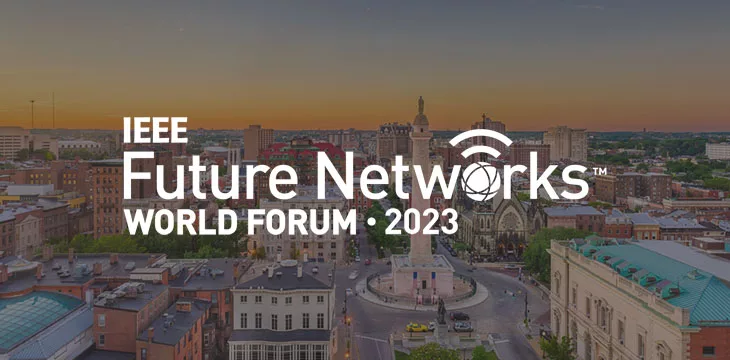|
Getting your Trinity Audio player ready...
|
Are you a researcher with novel ideas on where blockchain technology will fit into networks of the future? The IEEE is seeking submissions for its Future Networks World Forum symposium in Baltimore, USA, from November 13 – 15, 2023.
Organizers of the symposium include IPv6 Forum chair Professor Latif Ladid and nChain Director of Research Dr. Owen Vaughan. Both will also lead sessions on topics specifically covering the IPv6 side of blockchain, including 5G networks, the Internet of Things (IoT), and cloud computing. Along with Ralph Wallace and Lawrence Hughes, they will look at issues affecting IPv6 standards and architecture, including cybersecurity and management, and enterprise networking.
Research paper submissions to IEEE’s Baltimore event do not necessarily need to touch IPv6 issues. The scope is broader, looking at use cases for blockchain technology that increase trust in networks and data, create new economic/incentive models, and help bridge gaps between computing (and related) disciplines.
The symposium’s website describes blockchain as “an open-source distributed database using state-of-the-art cryptography through a distributed ledger that enables trust among disparate individuals or third parties. (It) gives us a payment and data-integrity platform that can help build trust in digital environments.”
Its suggestions are the big-tent topics of Blockchain for Future Networks and IoT, as well as distributed computing and databases. Submissions could include details of specific tools to use, integration with other emerging topics, and even non-technical topics like regulation and law enforcement.
Artificial Intelligence (AI) is a popular buzzword in computing in the 2020s, with machine learning systems now beginning to emerge that can effectively mimic, and perhaps soon even rival, human minds in their capabilities. Given this, the IEEE Future Networks World Forum highlights the topic as one of interest, saying that there has been very little crossover between AI research and blockchain.
A high-transaction volume blockchain can strengthen AI systems by ensuring greater data integrity—both in machine learning training sets and algorithms. “This results in greater trust in our AI models and the removal of ambiguity and doubt,” it adds. With the ability to handle fast and cheap monetary payments of any size (even micro- and nano-transaction tiers), there are opportunities to create new financial incentives for developers and data suppliers. Blockchain can also provide a more trustworthy digital ID management system, protecting all participants (human and machine) from any problems that may occur in defining who is what—particularly in advertising and consumer services.
Over the past decade, there has been too much focus on the financial and payments side of blockchain technology, leading to the current situation where most people consider it merely a platform for speculating on the value of digital assets. However, it’s becoming increasingly necessary to showcase blockchain’s other benefits—as well as highlight the shortcomings many of today’s blockchain platforms have in their ability to process large amounts of data or keep usage costs to acceptable levels.
Papers for the IEEE Future Networks World Forum can be submitted through the conference document review and registration platform EDAS via the Symposium on Blockchain for Future Networks track. You can also find more detailed instructions on how to submit work on the event website.
Watch: Texas BSV Hackathon: Ty Everett on Building an Open-Source Ecosystem

 07-11-2025
07-11-2025 





